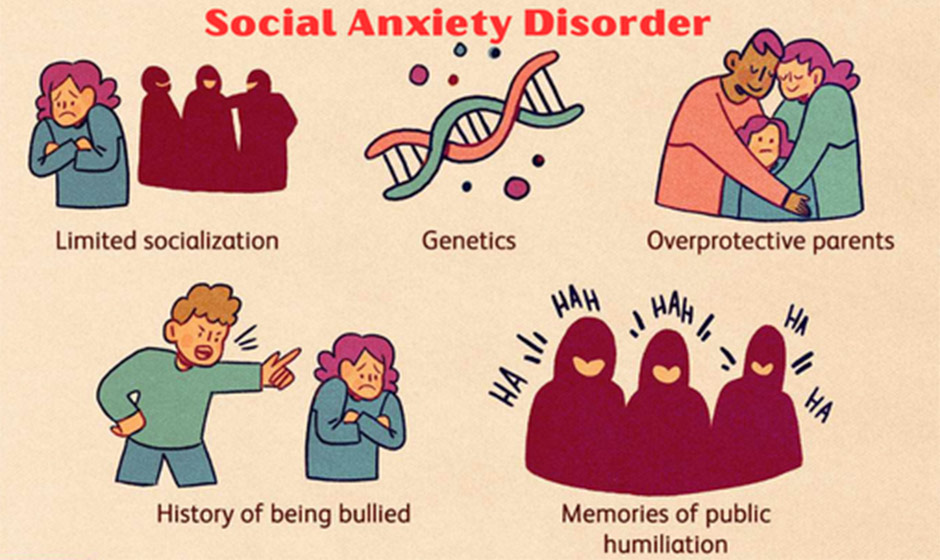
What is Social Anxiety Disorder?
Social Anxiety Disorder (SAD) is also known as Social Phobia. It is a condition that can cause people to feel highly anxious, fearful, and embarrassed when interacting with people. It generally happens in social or performance situations. It is common for people with a social anxiety disorder to think that public speaking and meeting new people can be embarrassing.
The fear of being judged by others and humiliated can cause people with a social anxiety disorder. They choose to avoid certain social situations altogether. People with a social anxiety disorder may also be self-conscious. They feel shy and avoid eye contact when speaking to or interacting with others.
Fortunately, social anxiety disorder is a treatable condition. Treatment focuses on helping those with the disorder learn to manage their symptoms. The treatments may include Cognitive Behavioral Therapy (CBT) or other psychotherapy and relaxation techniques.
Types of Social Anxiety Disorder:
1 – Major Social Anxiety Disorder:
This type of social anxiety is highly intense and linked to extreme fear and anxiety in social situations.
People with this disorder may intensely fear public speaking, meeting new people, and being seen in public. They may also be highly self-conscious and embarrassed in social situations. Symptoms can lead to avoidance of social situations altogether.
2 – Generalized Social Anxiety Disorder:
This type of anxiety is characterized by a fear of, or intense discomfort in, most social situations. People with this type of social anxiety tend to feel self-conscious and anxious in any social interaction. Fear and anxiety can interfere with work, school, and personal relationships.
3 – Performance Anxiety:
This type of social anxiety is usually linked to a fear of being judged or evaluated by others in a specific kind of performance or public speaking. It can cause intense fear and anxiety leading to the performance, often resulting in performance-avoidance.
4 – Public Speaking Anxiety:
This type of social anxiety is related to a fear of speaking in public or giving presentations in front of an audience. It is one of the most common forms of social anxiety and can cause intense fear and anxiety in many people.
Symptoms of Social Anxiety Disorder:
- Intense feelings of worry and self-consciousness in everyday social situations
- Racing heart, shaky hands, and dizziness
- Avoidance of social situations or places like parties, restaurants, or even work and school
- Fear of being judged or scrutinized
- Worries about embarrassing oneself
- Concerns about saying the wrong thing and being rejected
- Inhibition in conversations and remaining quiet
- Panic or freeze up when asked to speak in public
- Not keeping eye contact out of fear of being judged
- Intense fear of strangers or new social settings
Causes of Social Anxiety Disorder:
• Genetics. A social anxiety disorder may be more likely to develop in specific individuals due to genetic influences.
• Continuing or persistent long-term stress. Experiencing long-term stress can trigger or exacerbate the symptoms of social anxiety disorder.
• Negative experiences in social situations: Having a negative experience in social settings. Situations like being embarrassed can lead to social anxiety disorder.
• Perception of others: Individuals with a social anxiety disorder may perceive others as judgemental or hostile, increasing their anxiety.
• Developmental issues: Certain aspects of development, such as childhood trauma, can lead to social anxiety disorder.
• Critical parental behavior: Harsh or critical parenting can cause an individual to become anxious in social situations.
• Excessive physical health concerns: Excessive worrying about one’s physical health can increase social anxiety disorder.
• Perfectionism: An excessive need to achieve perfection can lead to a fear of failure in social settings. It leads to increased social anxiety disorder.
Treatment for Social Anxiety Disorder:
Cognitive Therapy:
Cognitive therapy identifies and changes specific thought patterns associated with social anxiety. Therapists use techniques such as mindfulness and cognitive restructuring to challenge negative thoughts and reframe them in more positive ways.
Medication:
Medications can also be used to help lessen the symptoms of social anxiety disorder. Drugs such as (SSRIs), monoamine oxidase inhibitors (MAOIs), or benzodiazepines can help reduce symptoms. These drugs should only be taken as prescribed and supervised by a qualified healthcare provider.
Exposure Therapy:
Exposure therapy is behavior therapy that helps people confront their fears by gradually learning to tolerate situations that cause discomfort. This type of therapy requires patience and dedication, as improvements may take time. Exposure therapy can be used in conjunction with cognitive and drug therapies to increase the effectiveness of treatment.
Coping Strategies for Social Anxiety Disorder:
Acknowledge your emotions and be kind to yourself:
Social anxiety disorder can be challenging, but fighting your emotions or trying to deny them can make the feelings even more difficult. Remind yourself that feeling scared or uncomfortable in social situations is okay.
Work on thought patterns:
People with social anxiety often have persistent negative thoughts about themselves and the opinion of others. Acknowledging and challenging these thoughts can help ease stress. List the negative thoughts and ask yourself if they are true or just an exaggeration.
Develop relaxation techniques:
Relaxation techniques such as deep breathing, visualizations, and progressive muscle relaxation can help reduce anxiety in social situations. Practice these techniques in your everyday life and learn to recognize when you’re feeling anxious so you can use the techniques as needed.
Exercise:
Regular physical activity can help reduce stress and improve self-confidence, which can help reduce symptoms of social anxiety. Focus on activities that you enjoy or consider challenging yourself with a new activity.
Work on communication skills:
Learning healthy communication skills can be vital to overcoming social anxiety.
Conclusion:
In conclusion, understanding social anxiety disorder is critical to supporting those with it. Symptoms include intense fear or anxiety in social situations and extreme physical reactions. They also face the fear of being judged, or they could experience symptoms of a panic attack.

Leave a Reply